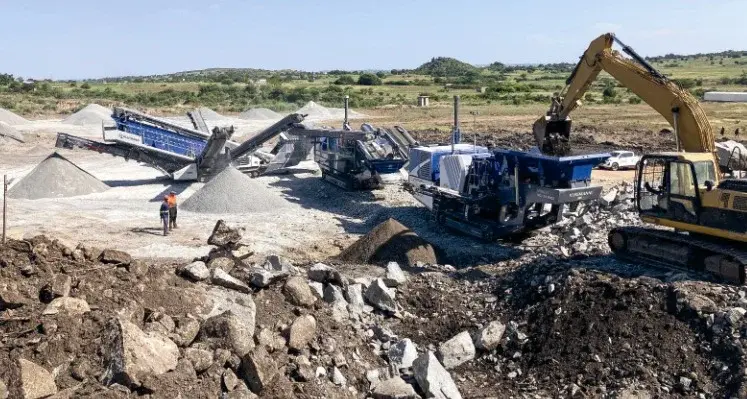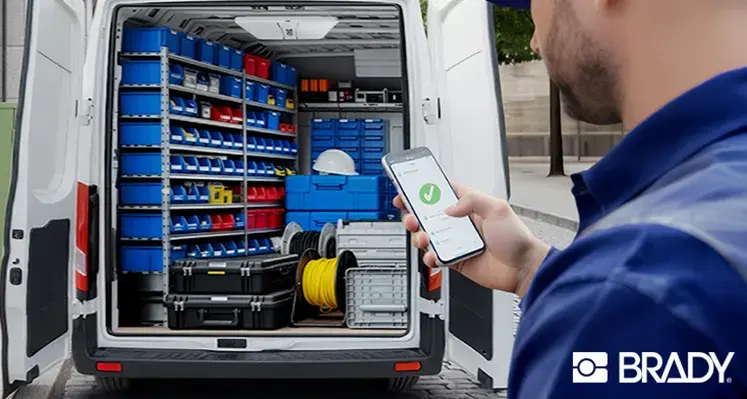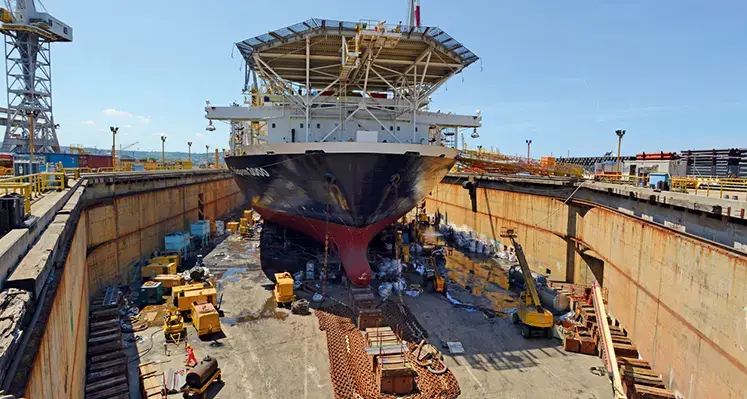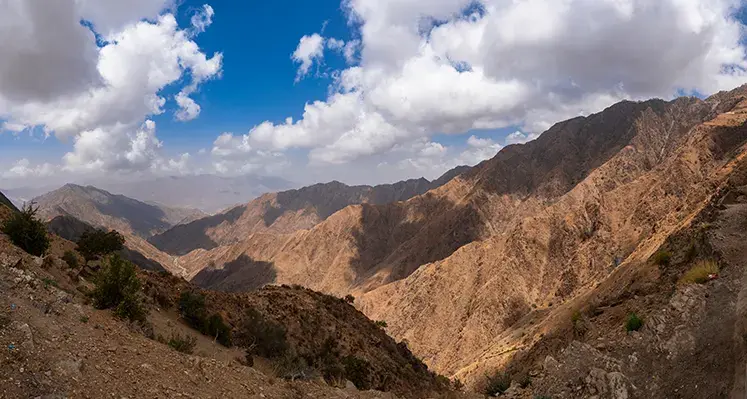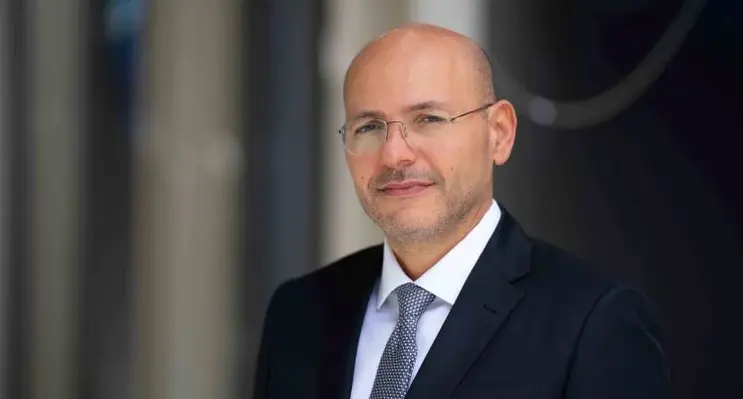In The Spotlight
Panafrican named Wirtgen Group regional dealer
The Wirtgen Group has announced the appointment of Panafrican Equipment Group as its new authorised dealer, expanding access to its complete line of products and technologies across Kenya, Tanzania, Uganda, Rwanda and Burundi in East Africa, as well as Ghana and Sierra Leone in West Africa
In Nigeria, the partnership will specifically cover the group’s minerals and soil compaction portfolio.
A long-standing partner across Africa
For decades, the Wirtgen Group has maintained a strong presence on the continent. Its six specialist brands – Wirtgen, Vögele, Hamm, Kleemann, Benninghoven and Ciber – work in synergy to meet the specific requirements of customers across diverse sectors. Together, they bring proven expertise and extensive industry knowledge to African markets. “With the innovative road construction and mineral solutions, the Wirtgen Group is well equipped to meet future challenges”, says Jerry Muchiri, Manager Regional Business and Dealer Development East Africa and Nigeria at Wirtgen International GmbH.
Panafrican’s strong after-sales commitment
Panafrican’s established footprint and its commitment to high-quality service delivery will further strengthen access to Wirtgen Group’s technologies throughout the region. “As authorised dealer, Panafrican provides complete support for all construction and mineral processing needs, combining our service expertise with Wirtgen Group's innovative portfolio and applications know how,” commented Scott McCaw, CEO and managing director Panafrican Group.
The collaboration positions both companies to deliver enhanced customer support and reinforces their shared dedication to innovation, quality and customer-centric service.
Streamline field operations with Brady’s RFID inventory solution
Get a real-time list of equipment present in a vehicle and see what is missing versus an established vehicle equipment list. Select missing tools on-screen. Quickly home in with proximity-increasing sounds and visuals on a portable RFID reader
Discover the affordable RFID Scan & Drive solution from Brady!
Have you ever arrived at an intervention without the necessary equipment? Ever lost tools during field interventions? How much time do you spend to make sure all equipment is accounted for, and present in your vehicles? Now you can confirm vehicle inventories digitally and automatically, highlight any missing assets, and home in on misplaced items to quickly complete your vehicles. How much time could you save?
Everything present
Instantly see which tools are present in a vehicle - and what is missing. Easily save substantial time per vehicle, per intervention, with automated equipment inventory checks that take only seconds.
By labelling equipment with passive, battery-free UHF RFID labels, we can let an RFID reader in your vehicle detect which tools and items are present. The RFID reader can check detected tools versus a list of expected items to confirm a complete vehicle inventory or to highlight missing equipment on your phone.
Be fully equipped before leaving for a field intervention. Avoid losing tools after interventions. Don’t waste time checking visually where every piece of equipment is. Just scan, get confirmation in seconds, and drive to your next destination.
Home in on assets
Quickly find misplaced equipment. Home in on specific items with a portable RFID reader and proximity-increasing sounds and visuals.
Passive, battery-free UHF RFID labels bounce back radio signals from a portable RFID reader up to 15 metres. By measuring the strength of the returning radio signal with patented data capture technology, our portable RFID readers guide users towards a unique RFID label applied on a specific tool. When closing in, auditive and visual feedback strength from the reader increases.
RFID labels can include an LED, powered by an RFID reader from a 1.5 metre distance, to let a tool light up or to find it in a dense inventory of equipment.

Solution components
Brady develops and manufactures every component in our solution. Tested in in-house laboratories, each component is designed to withstand the wear and tear of field interventions, including exposure to UV, dust and moisture.
- RFID labels: Brady offers industrial grade on- and off-metal RFID-labels and tags that stay attached and remain legible on your equipment.
- Fixed RFID readers: Equipped with patented data capture technology, Brady’s fixed RFID readers collect data on items passing through their read range.
- Portable RFID readers: With intuitive displays, Brady’s portable RFID readers and SLEDs deliver unmatched mobility, data collection and interaction.
Are you interested in automated inventory checks solution from Brady? Visit our website, watch the short video and download the free RFID labelling guidebook.
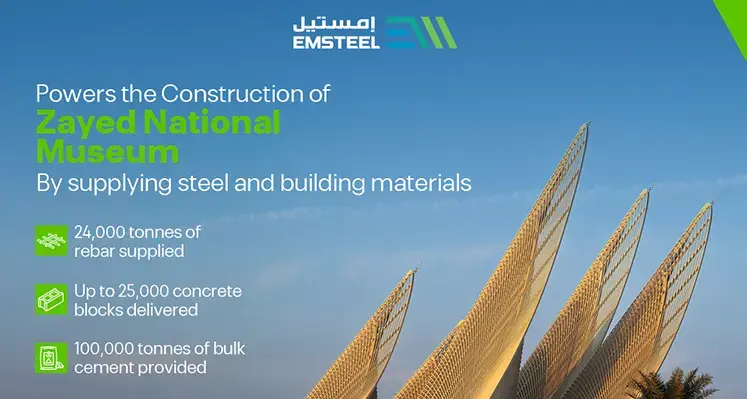
.The museum stands as a profound tribute to the life, leadership, and legacy of the late Sheikh Zayed bin Sultan Al Nahyan.(Image source: EMSTEEL)
EMSTEEL powers construction of the Zayed National Museum
EMSTEEL has announced its pivotal contribution to the construction of the iconic Zayed National Museum—the newest cultural beacon in Abu Dhabi’s Saadiyat Cultural District.
Officially inaugurated by the UAE President, His Highness Sheikh Mohamed bin Zayed Al Nahyan, and attended by Their Highnesses the Supreme Council Members and Rulers of the Emirates, the opening formed part of the nation’s celebrations for the 54th Eid Al Etihad. The museum stands as a profound tribute to the life, leadership, and legacy of the late Sheikh Zayed bin Sultan Al Nahyan, embodying the UAE’s unity, heritage, and ambitious future.
Throughout the museum’s development, EMSTEEL played a central role by supplying the structural backbone of this architectural masterpiece. Across three years, the Group delivered approximately 24,000 tonnes of rebar, up to 25,000 direct block units, and around 100,000 tonnes of bulk cement. These critical materials underpinned the engineering integrity of the project, enabling the creation of a landmark that will serve as a cultural touchstone for generations to come.
Saeed Ghumran Al Remeithi, group CEO of EMSTEEL, said,“The opening of the Zayed National Museum on the 54th Eid Al Etihad is a defining moment for our nation. It reflects the vision of the late Sheikh Zayed bin Sultan Al Nahyan and the unity that shaped the UAE’s extraordinary journey of progress. As a national industrial champion, we are honoured that our steel and building materials contributed to a landmark of such cultural and historic significance. This project reflects our role in supporting the UAE’s long-term development and our commitment to fostering an industrial sector that continues to strengthen the nation’s future.”
EMSTEEL’s involvement in the Zayed National Museum adds to its impressive legacy of supporting the UAE’s most celebrated cultural and architectural undertakings. From Louvre Abu Dhabi and the Natural History Museum Abu Dhabi to the upcoming Guggenheim Abu Dhabi, along with national treasures such as Sheikh Zayed Grand Mosque and Dubai’s Museum of the Future, the Group has become synonymous with high-impact, visionary development.
These landmark contributions underline EMSTEEL’s position as a trusted partner in national progress. With an unwavering focus on sustainability, low-carbon manufacturing, and resilient local supply chains, EMSTEEL continues to bolster the UAE’s industrial strength while helping shape its cultural and architectural legacy.
Fincantieri signs shipbuilding MoU with Bahrain
Italian shipbuilder Fincantieri and ASRY (Arab Shipbuilding & Repair Yard) have signed an Memorandum of Understanding (MoU) to explore new opportunities for collaboration in the shipbuilding sector
Under the MoU, the two sides will jointly evaluate opportunities for the design and construction of offshore service and military vessels up to 80 metres in length, as well as the potential for export contracts in the Gulf area.
The agreement also includes maintenance, repair, and overhaul (MRO) services for military, commercial and offshore vessels, as well as the exchange of know-how in naval design and production process optimisation.
The military vessels would be intended for use by the Bahrain Navy and Coast Guard.
ASRY is a leading operator in ship repair and marine services in the Gulf of Bahrain.
Fincantieri was represented by its chairman, Biagio Mazzotta, and Eugenio Santagata, general manager of the Fincantieri Naval Vessels Division, who signed the agreement together with Ahmed AlAbri, CEO of ASRY.
Pierroberto Folgiero, CEO and managing director of Fincantieri, said the MoU represents an opportunity for Fincantieri to enter the Bahraini shipbuilding market and is a further step in consolidating the group's strategy and presence in the Middle East.
“This agreement strengthens our strategic position in the Gulf and confirms Fincantieri's desire to develop long-term industrial partnerships with leading partners such as ASRY,” said Folgiero.
“By combining complementary skills and converging visions, we are laying the foundations for a solid and structured presence in the Bahraini shipbuilding market, in line with the objectives of our integrated export platform in the Middle East.”
The signing of the MoU took place on the sidelines of the 46th Gulf Cooperation Council Summit in the presence of Italian President of the Council of Ministers Giorgia Meloni, and Bahrain’s Crown Prince and Prime Minister His Royal Highness Salman bin Hamad Al-Khalifa.
Separately, Fincantieri announced a partnership In Saudi Arabia with King Abdullah University of Science and Technology (KAUST) to establish a scholarship aimed at supporting young researchers in maritime security, cyber-resilience and emerging applied navigation technologies.
It follows an MoU signed last January and reflects a shared commitment of both sides in promoting excellence in education and technology transfer, in line with Saudi Arabia’s Vision 2030, a Fincantieri statement read.
“The scholarship will enable young and talented researchers to develop innovative solutions to counter new threats to navigation, such as recent cases of AIS and GPS spoofing, which can alter vessel positions and compromise the safety of shipping routes,” it stated.
The programme will focus on three strategic areas: the advanced authentication of AIS signals to prevent manipulation; the opportunistic detection of GPS spoofing through intelligent satellite data analysis, and star-based position verification enhanced by machine learning algorithms.
Fincantieri added that the goal is to develop an operational software platform that can be integrated into on-board digital systems, strengthening the collaboration between universities and industry and contributing to the growth of the Fincantieri Digital Ecosystem (FDE).
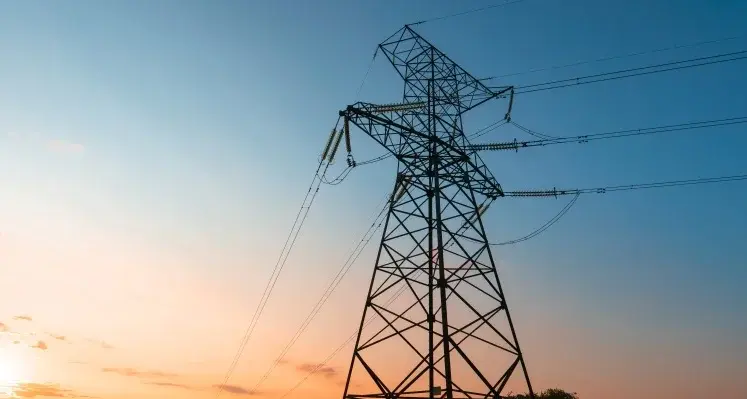
IEA reports 76 million employed in energy sector in 2024, but skilled labour shortages pose challenges
IEA warns Energy workforce faces gap
Significant global investment in energy infrastructure drove a 2.2% rise in energy-sector employment last year, nearly double the rate of job growth in the broader world economy, according to a new IEA report
The World Energy Employment 2025 report, released today, shows that the global energy workforce reached 76 million in 2024, an increase of over five million roles since 2019. Over the last five years, the energy sector has contributed 2.4% of all net new jobs created worldwide.
The power sector has been a key driver of this growth, accounting for three quarters of recent employment gains and now ranking as the largest employer in energy, overtaking fuel supply. Solar PV remains a major driver, complemented by expanding employment in nuclear power, electricity grids, and energy storage. As electrification spreads across industries, roles in EV manufacturing and battery production surged by nearly 800,000 in 2024.
Fossil fuel employment remained resilient throughout the year. Coal-sector jobs rose in India, China, and Indonesia, lifting coal employment 8% above 2019 levels despite sharp declines in advanced economies. The oil and gas industry has regained most of the jobs lost in 2020, although low prices and economic uncertainty have triggered some workforce reductions in 2025. Early data suggest that overall energy-sector employment growth may moderate to 1.3% this year, as tight labour markets and geopolitical tensions prompt caution among employers.
Despite the sector’s strong growth, the report highlights a worsening shortage of skilled workers. More than half of the 700 companies, unions, and training institutions surveyed through the IEA’s Energy Employment Survey reported critical recruitment bottlenecks that could delay infrastructure projects, slow major initiatives, and increase system costs.
“Energy has been one of the strongest and most consistent engines of job creation in the global economy during a period marked by significant uncertainties,” said IEA executive director Fatih Birol. “But this momentum cannot be taken for granted. The world’s ability to build the energy infrastructure it needs depends on having enough skilled workers in place. Governments, industry and training institutions must come together to close the labour and skills gap. Left unaddressed, these shortages could slow progress, raise costs and weaken energy security.”
Technical and applied roles such as electricians, pipefitters, line workers, plant operators, and nuclear engineers are particularly hard to fill. These occupations have added 2.5 million jobs since 2019 and now represent more than half of the global energy workforce, more than double their share of total employment across the wider economy.
Demographic pressures are also intensifying. In advanced economies, 2.4 energy-sector workers are nearing retirement for every new entrant under 25. Nuclear and grid-related professions face some of the steepest ageing challenges, with retirement-to-new-entrant ratios of 1.7 and 1.4 to 1, respectively.
At the same time, the supply of newly trained workers is insufficient to meet demand. To prevent the skills gap from widening by 2030, the number of new qualified energy workers globally must increase by 40%. Achieving this would require an additional US$2.6bn per year, less than 0.1% of total global education spending.
The report stresses that policy action can help address these challenges. Respondents identified training costs, foregone wages, and limited awareness of programmes as major barriers to entry. Effective measures include financial incentives for learners, expanded apprenticeship schemes, increased private-sector participation in curriculum design, and investment in training facilities. Reskilling within the sector is also essential. While some regions are already seeing declines in fossil fuel employment, targeted retraining programmes could help workers transition to fast-growing areas of the energy system.
Power infrastructure deal for Soudah Peaks
Soudah Development, a Public Investment Fund (PIF) company, has announced a project to deliver advanced power infrastructure to its Soudah Peaks development
The company signed an agreement with National Grid, a subsidiary of the Saud Electricity Company, valued at more than SAR 1.3bn (US$346mn), to develop and deliver power systems for its luxury mountain-based resort.
The company said in a statement that the strategic partnership marks a “critical milestone” in the development of Soudah Peaks.
Its project is described as an ultra-luxury mountain destination in Saudi Arabia, rising 3,015 metres above sea level.
Under the agreement, National Grid will design and construct the integrated electrical network that includes a 380/132 kV central substation with a capacity of 500 MVA, as well as two 132/13.8 kV high-voltage substations.
This infrastructure will form the backbone of the utility ecosystem across all zones of the project, ensuring reliable power delivery to hospitality, residential, commercial, and public assets, for all development phases.
“This agreement represents a pivotal milestone in developing the electrical infrastructure for the Soudah Peaks project,” said Eng. Waleed Al-Saadi, CEO of the National Grid SA.
“It reflects our firm commitment to supporting major development initiatives in the kingdom through integrated solutions built on the highest standards of efficiency and reliability.”
Al-Saadi also said that the partnership with Soudah Development underscores its central role in enabling luxury tourism destinations and the kingdom’s growing economic landscape.
“By establishing an advanced electrical network tailored to meet the project’s needs across all phases, we reaffirm National Grid SA’s continued efforts to enhance the readiness and resilience of the power system in alignment with sustainability goals and Saudi Vision 2030.”
Eng. Saleh Al-Oraini, CEO of Soudah Development, said it marks a defining step forward in the journey to develop Soudah Peaks.
“Through our partnership with National Grid SA, we are securing the infrastructure foundation needed to power all of Soudah Peaks development phases.”
HRH Prince Mohammed bin Salman announced the launch of Soudah Development Company (SDC) in 2024, with plans to attract over two million visitors annually and create 8,000 direct and indirect permanent jobs by 2030.
Read more:
ACWA Power closes major Saudi renewables deal
IEA reports faster global progress on energy efficiency in 2025
Hussein Shoukry leads Siemens Energy MEA
Siemens Energy has named Hussein Shoukry as the new managing director for the Middle East and Africa. He takes over from Dietmar Siersdorfer, who is retiring after an impressive career spanning nearly four decades with the company.
Based in the UAE, Hussein will oversee Siemens Energy’s operations and strategic initiatives across a regional network of 29 offices, employing more than 4,000 people and generating EUR 9 billion in order intake in fiscal year 2025.
“Rising energy demand is reshaping the future of both the Middle East and Africa,” Hussein said. “In the Middle East, countries are embracing a diversified energy mix and building localized supply chains, while in Africa the priority is expanding reliable electricity access for millions. The region also includes markets where critical energy infrastructure is being rebuilt or modernized.”
He added, “With our broad portfolio in energy technology and long-standing presence, Siemens Energy will remain a committed partner in meeting these needs and strengthening the resilience of the Middle East and Africa’s energy systems.”
Hussein brings extensive experience in managing complex energy projects and enhancing global execution capabilities. Since joining Siemens Energy in 2003, he has held multiple leadership roles, most recently as Senior Vice President for Project Execution, where he led a team of over 3,500 employees and managed the company’s global Competence Centers in Romania, Mexico, and India.
Holding a degree in Construction Engineering from the American University in Cairo, Hussein’s engineering background, project execution expertise, and deep understanding of diverse energy markets across Europe and the Middle East equip him to lead Siemens Energy’s business in the Middle East and Africa effectively.
HANNOVER MESSE
Venue:
Hannover
Dates:
17-21 April 2023
Website:
https://www.hannovermesse.de/en/
17 Apr 23 - 21 Apr 23
Venue:
Hannover
Dates:
17-21 April 2023
Website:
https://www.hannovermesse.de/en/




